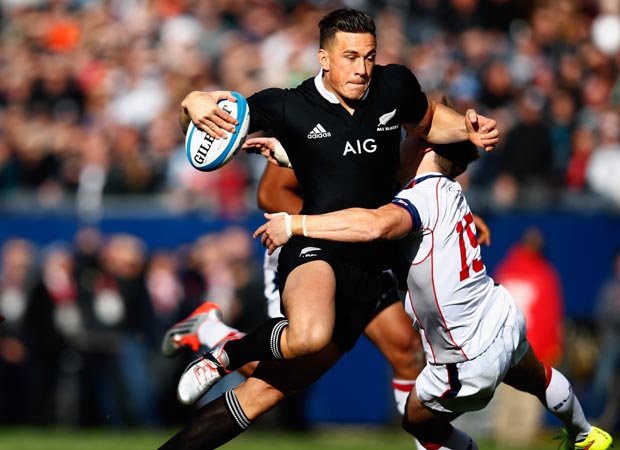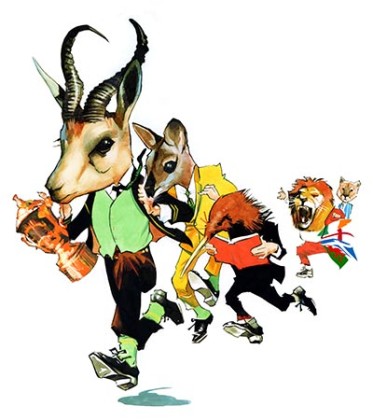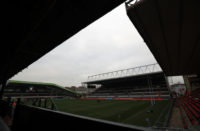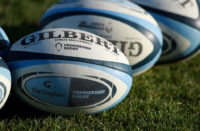 Of the seven World Cups that have preceded the 2015 edition which kicks off next month all but one have been won by the Southern Hemisphere powers, New Zealand, South Africa and Australia, with England's 2003 campaign the only time a Northern Hemisphere nation has broken the stranglehold.
Of the seven World Cups that have preceded the 2015 edition which kicks off next month all but one have been won by the Southern Hemisphere powers, New Zealand, South Africa and Australia, with England's 2003 campaign the only time a Northern Hemisphere nation has broken the stranglehold.
That legacy is not as important as current form, but the bad news for fans in the North is that the quality of what we have seen in this season's truncated Rugby Championship indicates that the world champion All Blacks, the Springboks and the Wallabies are still pitching at a higher level than their Six Nations counterparts.
The 40 points New Zealand put on Australia in Auckland yesterday may not have got them back the Rugby Championship title that the Aussies claimed with their narrow win in Sydney a week earlier, but it left no-one in any doubt that NZ are top of the pecking order going into the World Cup.
It is not just the pace and intensity the All Blacks summon consistently, but the precision skills of each player and the tactical innovations, and reinventions, in which their coaches school them. For instance, a Dane Coles strike at the scrum delivers the ball to No.8 Kieran Read's feet light-years faster than any other Test hooker, turning the scrum into a lethal attacking option. It's old school, but very effective.
However, I'm not convinced that Australia's heavy defeat on the Kiwi side of the Tasman is the be-all and end-all, because coach Michael Cheika was experimenting by making six changes to his winning line-up in Sydney. What is sure is that the experiment did not work, because rather than putting a worm of doubt in the minds of Richie McCaw and his mates, it ended up getting the All Blacks back on track.
The Quade Cooper option backfired, and the back-row changes also left the Aussies much less effective at the breakdown. As a result, they had none of the sustained momentum they enjoyed in Sydney – but even so Cheika knows after this drawn mini-series with NZ that the double openside strategy of playing David Pocock and Michael Hooper together is one that can upset the world champs.
That is some trump card to have in your hand, and Cheika missed a trick by not starting them together at Eden Park. In the fall-out he will have gleaned that while Australia are capable of beating NZ, they can only do it if they play right at the top of their game – and that Hooper and Pocock are intrinsic to that.
At the moment the Wallabies struggle to reproduce intensity match-on-match like Steve Hansen's super-fit crew, and there were long periods in the second half in
Auckland when they looked sapped of energy while the hosts had only just engaged overdrive.
Good news for England and Wales, but another concern for Cheika, is finding a go-to goal-kicker. In this Championship series Matt Giteau, Bernard Foley, Nic White and Cooper all had a go at the kicking duties, but none of them bar White looked an 80 per cent marksman – and the Brumbies scrum-half could struggle to stay in the match 23 if/when Will Genia regains full fitness.
 There is no doubt, though, that overall Australia's stock has risen, not least because with Scott Sio and Sekope Kepu in tandem at prop the scrum rot that had set in over a number of years looks as if it has been treated pretty effectively. They are also blessed with an attacking Rolls-Royce of a full-back in Israel Folau, whose ability to soar for the high-ball is unrivalled.
There is no doubt, though, that overall Australia's stock has risen, not least because with Scott Sio and Sekope Kepu in tandem at prop the scrum rot that had set in over a number of years looks as if it has been treated pretty effectively. They are also blessed with an attacking Rolls-Royce of a full-back in Israel Folau, whose ability to soar for the high-ball is unrivalled.
By contrast, South Africa's credibility took a heavy knock when Argentina recorded a first victory over them, scoring four tries in their 37-25 triumph in Durban. This unexpected turn of events not only left the Springboks bottom of the table, but highlighted problems in the tight-five, an area where the South Africans expect to dominate.
Heyneke Meyer is scratching about for credible replacements for starting props Tendai Mtawarira and Jannie du Plessis, with Vincent Koch struggling against Marcos Ayerza and the other back-up tighthead, Frans Malherbe, under the cosh against the Wallabies in Brisbane.
The Springbok coach is also running out of bodies in the second-row. With Victor Matfield increasingly injury-prone at the age of 38, there is not much in reserve if either of his impressive young guns, Eben Etzebeth and Lood de Jager, are crocked.
After the Pumas pack fronted-up strongly to underpin the landmark win, their coach Daniel Hourcade said: “We played well and won the mental battle. That is the key to beating the Springboks – you need to be mentally tough.”
Meyer's own reserves of mental toughness were soon tested when not only did the South African media turn on the coach, but he was also attacked by the South African trade union Cosatu for “racist choices” in selection after picking only two non-white players in the starting line-up against Argentina.
The union called on him to be sacked on the basis that, “Black players are excluded to make place for Heyneke's White Favourites”. Cosatu took umbrage in particular at his selection of Jean de Villiers, following the Springbok captain's recovery from a cruciate injury, saying he should have had to play his way back into contention.
Given that De Villiers is an inspirational centre with world class attributes and 106-caps worth of experience Cosatu could not have picked a worse target to illustrate their point. Race relations remain a vexed and complex issue in South Africa, but the message to the Cosatu politicos is that if you want to wade into selection in sport, do your homework better.
As for South Africa, they will still pack a punch at the World Cup, and it will be well against the odds if, with Argentina starting to fire, all four Rugby Championship sides do not make the quarter-finals.
It will be an even bigger upset if the Southern Hemisphere big three do not claim at least two semi-final berths, and one of them win the 8th World Cup – with New Zealand, as ever, firm favourites.



























